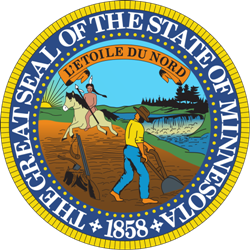Minnesota’s 1st CD Special Poised for Record Number of Candidates
Barring any candidate withdrawals by Wednesday, voters will have more Republican and Democratic choices than in any congressional district primary election in state history

Through Thursday, seven Republicans and five DFLers have already filed (in addition to a Legal Marijuana Now candidate).
If all of these candidates remain in the race for the May 24th primary, it will mark the largest number of Democrats and Republicans on the ballot in a Minnesota Congressional District primary since direct elections for nominees were instituted in U.S. House races in 1906.
Minnesota Republicans have not had seven candidates on a U.S. House primary ballot since the last special election for the southern 1st CD seat back in February 1958 following the death of Republican August H. Andresen on January 14, 1958.
Former state Senator Al Quie easily dispatched with the remaining six candidates, defeating Waseca newspaper editor Don Brown by 38.1 points.
Republican voters have had seven or more options in U.S. House primaries in just four other elections:
- 1936 (2nd CD): Former Railroad and Warehouse Commissioner Christian Laurisch defeated Mankato attorney and former state Senator Louis P. Johnson by 4.3 points
- 1940 (9th CD): State Representative Colvin Butler beat former state Senator Ole Sageng by 5.6 points in a party record nine-candidate race
- 1946 (3rd CD): Former state Representative George MacKinnon nipped Minneapolis Park Commissioner Walter Quist by 3.3 points in an eight-candidate battle
- 1956 (3rd CD): Former basketball star George Mikan beat St. Louis Park Mayor Russell Fernstrom by 38.2 points in a seven-candidate field
[Note: In 1932, all nine Minnesota U.S. seats were elected at-large. As a result, 32 Republicans appeared on a single, state-wide primary ballot with the top nine moving on to the general election].
Adding in the five Democrats who have filed in 2022’s 1st CD special, 12 candidates are slated to appear on the May primary ballot.
The previous record of 11 Democratic and Republican candidates was reached twice:
- 1936 (5th CD): Six Republicans (won by former U.S. Representative Walter Newton) and five Democrats (won by Minneapolis attorney Michael Dillon)
- 1946 (3rd CD): Eight Republicans (won by the aforementioned George MacKinnon) and three DFLers (won by incumbent and former Minneapolis street sweeper William Gallagher who died before the general election)
Additionally, U.S. House primaries involving Farmer-Labor candidates were held from 1922 to 1942 with a high water mark of nine candidates during 1926’s 6th CD race won by Sam Shipstead (brother of Farmer-Labor U.S. Senator Henrik Shipstead).
Other parties with sporadic major party status in Minnesota for which U.S. House primaries have occasionally been held over the decades include Public Ownership, American, Reform, Independence, Constitution, Green, Grassroots-Legalize Cannabis, and Legal Marijuana Now.
It should also be noted primary rules have changed over the decades in Minnesota regarding whether unopposed major party candidates will be on the primary ballot.
From 1906 through 1912, there was a primary in every district even with unopposed contests.
From 1914 through 1952, primaries were held only if a party in the district had more than one candidate on the ballot.
From 1954 through 2004 there was a return to the original law, in which primaries were conducted in every district even in unopposed contests.
Since 2006, primaries have been held for all major parties in a district if at least one of them has two or more candidates file for the primary.
Candidates for the 2022 1st CD special can file until March 15th and are able to withdraw and remove their name from the ballot by March 16th.
Follow Smart Politics on Twitter.
